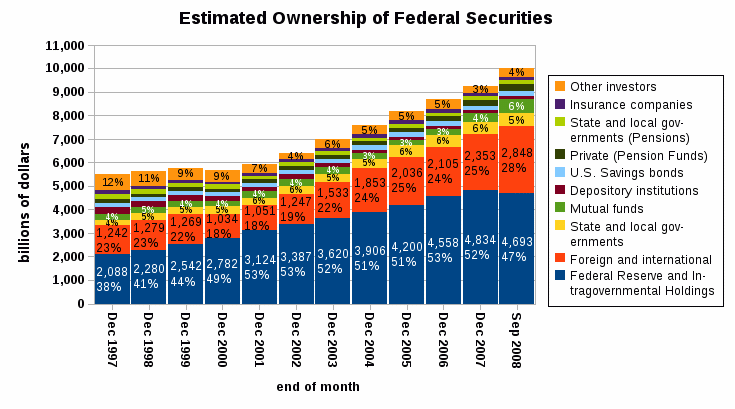| Description |
English: Estimated ownership of all US treasury securities (national debt) since 1997. The data was obtained from the US treasury at: http://fms.treas.gov/bulletin/index.html
Choose the "Ownership of Federal Securities" document on that page to
view the data. See TABLE OFS-2.—Estimated Ownership of U.S. Treasury
Securities. The link to the document used for this image: http://fms.treas.gov/bulletin/b2009-1ofs.doc
|
| Date | September 2008 |
| Source | Own work by uploader. Created with OpenOffice.org Calc using data from the US Treasury. |
| Author | Analoguni |
-
Wed Feb 29, 2012 2:30 PM EST
Valerie
Jarrett, a senior aide to President Obama, argued the other day that
unemployment benefits "stimulate the economy." The Romney campaign
apparently didn't care for the remark.
"First they told us that borrowing $1 trillion from China was supposed to stimulate the economy," a campaign spokesperson said. "Then just yesterday, one of President Obama's top advisors said that unemployment stimulates the economy. That's like saying an iceberg stimulated the Titanic. Only in White House fantasy world do debt, unemployment and higher taxes stimulate the economy."
It's unsettling how easily confused Team Romney gets on these issues. The economy is supposed to be the former governor's signature issue.
For one thing, the stimulus (a) didn't cost $1 trillion; (b) wasn't financed by China; and (c) really did stimulate the economy. For another, Jarrett didn't say "unemployment stimulates the economy"; she said unemployment benefits stimulate the economy.
And third, whether the Romney campaign likes it or not, Jarrett was right. Paul Krugman had a column on this a while back that the former governor might find helpful.
In fact, when it comes to bang for the buck, jobless aid is the second most effective stimulus in the public-sector arsenal, right behind food stamps.
So who's actually stuck in a "fantasy world"?
"First they told us that borrowing $1 trillion from China was supposed to stimulate the economy," a campaign spokesperson said. "Then just yesterday, one of President Obama's top advisors said that unemployment stimulates the economy. That's like saying an iceberg stimulated the Titanic. Only in White House fantasy world do debt, unemployment and higher taxes stimulate the economy."
It's unsettling how easily confused Team Romney gets on these issues. The economy is supposed to be the former governor's signature issue.
For one thing, the stimulus (a) didn't cost $1 trillion; (b) wasn't financed by China; and (c) really did stimulate the economy. For another, Jarrett didn't say "unemployment stimulates the economy"; she said unemployment benefits stimulate the economy.
And third, whether the Romney campaign likes it or not, Jarrett was right. Paul Krugman had a column on this a while back that the former governor might find helpful.
When the economy is booming, and lack of sufficient willing workers is limiting growth, generous unemployment benefits may keep employment lower than it would have been otherwise. But as you may have noticed, right now the economy isn't booming -- again, there are five unemployed workers for every job opening. Cutting off benefits to the unemployed will make them even more desperate for work -- but they can't take jobs that aren't there.The basic concept here is quite simple: unemployment benefits are good for the economy. People who receive the aid aren't sticking it in a mattress or a money-market fund; they're spending it and doing so immediately because it's their main source of income. This injects demand and capital into the economy quickly, helping the beneficiaries and the rest of us.
Wait: there's more. One main reason there aren't enough jobs right now is weak consumer demand. Helping the unemployed, by putting money in the pockets of people who badly need it, helps support consumer spending. That's why the Congressional Budget Office rates aid to the unemployed as a highly cost-effective form of economic stimulus. And unlike, say, large infrastructure projects, aid to the unemployed creates jobs quickly -- while allowing that aid to lapse, which is what is happening right now, is a recipe for even weaker job growth, not in the distant future but over the next few months.
In fact, when it comes to bang for the buck, jobless aid is the second most effective stimulus in the public-sector arsenal, right behind food stamps.
So who's actually stuck in a "fantasy world"?


No comments:
Post a Comment